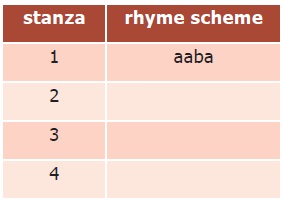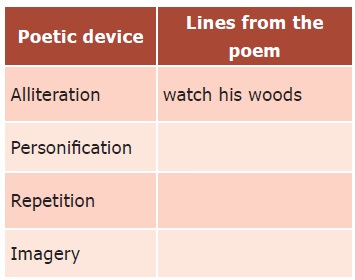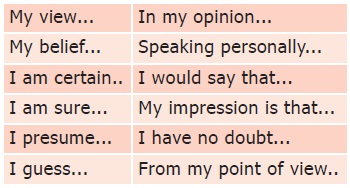Poem by Robert Frost - Listening, Writing and Reading - Stopping by Woods on a Snowy Evening | 9th EM English : Poem : Stopping by Woods on a Snowy Evening
Chapter: 9th EM English : Poem : Stopping by Woods on a Snowy Evening
Listening, Writing and Reading - Stopping by Woods on a Snowy Evening
A. Answer the following questions in a sentence or two.
1. He
will not see me stopping here To watch his woods fi ll up with snow.
a)
Who does
‘he’ refer to?
b)
Identify
the season with these lines
2. My
little horse must think it queer To stop without a farmhouse near
a)
Who is
the speaker?
b)
Why
should the horse think it queer?
c)
Pick out
the rhyming words.
3. He
gives his harness bells a shake To ask if there is some mistake.
a)
Whom does
‘he’ refer to in these lines?
b)
Why does
‘he’ give his harness bells a shake?
c)
How does
the horse communicate with the poet?
4. The
woods are lovely, dark and deep, But I have promises to keep
a)
How are
the woods?
b)
Who does
‘I’ refer to?
c)
What are
the promises the speaker is talking about?
5. And
miles to go before I sleep, And miles to go before I sleep.
a)
Why has
the poet repeated the last line?
b)
Explain:
miles to go before I sleep
B. Write down the summary of the poem by filling in the blanks.
After a
long travel the poet entered a___________. He wondered to whom the wood
_______! He realized that the owner of the wood lived in a ________. He was
happy that the owner would not be able to ___________him stopping in his woods
to watch _____________ fill the woods. The poet felt that the horse would think
it very _________ to stop near the woods as he had never _____. He was actually
standing between the woods and _______. The time was ________. The horse
indicated that the poet has made a ________ by shaking its head. The poet felt
that the woods are lovely, _______ and ______. He suddenly realized that he had
worldly ______which would not allow him to _______ in the woods for a long
time.
C. Answer the questions in three or four sentences.
a. What information does the poet highlight about the season and the time of
the day in the poem?
b. In
which way is the reaction of the speaker different from that of the horse? What
does it convey?
c. What
are the sounds heard by the poet?
d. The
poet is aware of two choices. What are they? What choice does he make
ultimately?
Pe. ick
out words from the poem that bring to mind peace and quiet.
Appreciating the poem
D. Identify the rhyme scheme used
in each stanza. One example has been done for you.

E. Complete the table by
identifying lines, against the poetic devices from the poem. One example is
done for you.

Listening
F. Listen to your teacher read a
passage or play on a recorder, on the importance of keeping promises. As you
listen, complete the blanks.
a.
When you
make a promise, keep it, even if it____________ you more than you expected.
b.
Do not
promise _______ but ______ more then you promise.
c.
A promise
________ people together.
d.
Some
people make promises _______.
e.
Saying
'yes' is easier than refusal but can lead to _________ and decrease in trust.
f.
Before
making promises, consider the long-term _______.
Writing
G. Answer the following questions
in a paragraph about 80 -100 words
a. It is
said that, “the choices made by one, shapes one’s destiny”. The theme of choice
is important throughout this poem.
H. Work in pairs and discuss the
factors that contribute towards making a choice and make a presentation to the
class.
I. Write down your presentation
as an article.
b. Though
attracted to the peace and quiet of the woods, the poet decides to go on to the
village. Express your opinion on why the poet does so.
J. You can use the following
words while expressing your opinion. Write a short speech in not more than
100-150 words.

Read and Enjoy
Leisure
What is
this life if, full of care, We have no time to stand and stare.
No time
to stand beneath the boughs, And stare as long as sheep or cows.
No time
to see, when woods we pass, Where squirrels hide their nuts in grass.
No time
to see, in broad daylight, Streams full of stars, like skies at night.
No time
to turn at Beauty’s glance, And watch her feet, how they can dance.
No time
to wait till her mouth can Enrich that smile her eyes began.
A poor
life this is, if full of care, We have no time to stand and stare.
William
Henry Davies
Related Topics